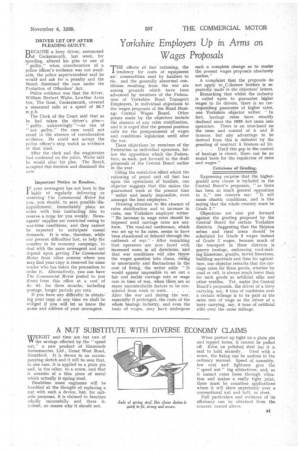Yorkshire Employers Up in Arms on
Page 27

If you've noticed an error in this article please click here to report it so we can fix it.
Wages Proposals
THE effects of fuel rationing, the I tendency for costs of equipment an-I commodities used by hauliers to risc, and the generally abnormal conditions resulting from the war are among grounds which have been advanced by members of the Federation of Yorkshire Road Transport Employers, in individual objections to the wages proposals of the Road Haulage Central Wages Board. Other points made by the objectors include the absence of any rates stabilization, and it is urged that the general position calls for the postponement of wages and conditions legislation until after the .war.
These objections by members of the Federation as individual operators, follow the opposition which the Federation, as such, put forward to the draft proposals of the Central Board earlier in the year.
Citing the restrictive effect which the rationing of petrol and oil fuel has uPon the operations of hauliers, one objector suggests that this makes the guaranteed week at the present time " unfair and nearly impossible, even amongst the best employers."
Drawing attention to he absence of rates stabilization and to increase in costs, one Yorkshire employer writes: " No increase in wage rates should be imposed until carriage rates are uniform. The road-rail conference, which was set up to fix rates, seems to have been abandoned or delayed through the outbreak of war." After remarking that operators 'are now faced with increased costs in all directions, and that war conditions will also throw the wages question into chaos, owing to uncertainty and fluctuations in the cost of living, the writer adds: "It would appear impossible to set out a fair and stable carriage rate or wage rate in time of war, when there are so many uncontrollable factors to be con sidered from week to week After the war and during the war, especially if prolonged, the costs of the whale haulage industry, and even the basis of wages, may have undergone
such a complete change as to render the prese,nt wages proposals absolutely useless."
A complaint that the proposals do not apply to.C-licence holders is repeatedly made in the objectors' letters.
Remarking that whilst the industry is called upon to guarantee higher wages to its drivers, there is no corresponding guarantee of higher rates, one Yorkshire objector writes: " In fact, haulage rates have steadily declined since the 1933 Act came into operation. There is an iron-hand on the issue and control of A and B licences, but any advantage to be derived from this is defeated by the granting of contract A licences ad lib. . . . . Until this gap in the control of haulage is closed, there can be no sound basis for the regulation of rates and wages."
Criticisms. of Grading.
. Expressing surprise that the highergraded area clause is included in the Central Board's proposals, "as there has been so much general opposition to it," one concern say: " It will cause chaotic conditions, and is like saying that the whole country must be Grade I."
Objections are also put forward against the grading proposed by the Central" Board for certain Yorkshire districts. Suggesting that the Skipton urban and rural areas should be scheduled for Grade 3 wages instead of Grade 2 wages, because much of the transport in these districts . is quarry haulage, embracing road-making limestone, granite, tarred limestone, building materials and lime for agriculture, one objector remarks that the carriage rates for these goods, whether by road or rail, is always much lower than for such goods' as artificial silks and other textiles. Yet, under the Central Board's proposals, the driver of a lorry carrying, say, 6 tons of roadstone over a certain mileage is to be paid at the same rate Of wage as the driver of a lorry carrying, say, 6 tons of artificial silks over the same mileage.




























































